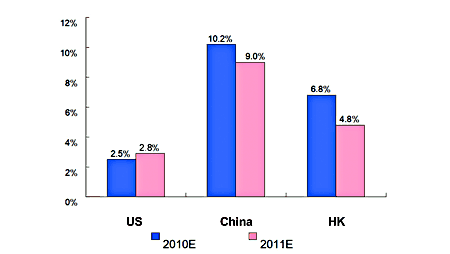 |
Most incoming data in U.S. have been stronger than expectation, with GDP growth at 2.5% in the third quarter of 2010. Yet, the improvement in GDP growth had mainly been due to temporary factors, such as inventory cycle and fiscal stimulus packages. With underlying final demand still stagnant, we call for a gradual decline in unemployment and modest economic growth in U.S. this year. Since there is so |  |
much slack, inflation is likely to stay well below the Federal Reserve's (Fed) comfort zone. We expect U.S. monetary policy to remain very accommodative. Resurgent worries over Euro-zone debt lead to a sharp deterioration of sovereign funding conditions in Europe after Moody's said it was concerned about Spain's high funding needs. In our view, an increasing number of countries eventually have to rely on inter-government funding assistance. We still see the funding situation for the Euro-zone peripheral countries as a significant risk. Nonetheless, the transmission through the financial system could have significant consequences for the rest of Europe. We believe the political will among Euro-zone governments to prevent any systemic event remains strong. |
| China has seen a strong rebound in growth, driven by domestic consumption and robust investment in 2010. However, headline growth rates should be lower in the next few years than in the pre-2007 boom, because of weaker global demand and slowdown in government spending. Moreover, China's policymakers are not shying away from leaning against the rise in asset prices. The policymakers are expected to manage continuously with a combination of exchange rate appreciation, intervention in the foreign exchange market, sterilization of excess liquidity and gradual tightening in monetary policy. But considering that domestic
demand is the key source of growth, we believe the policymakers will adopt a prudent monetary policy. | |
| Hong Kong has experienced a good year of growth in 2010. Looking ahead, overall economic activity is likely to stay robust this year, on the back of a healthy recovery in the domestic sector as well as the positive spillover of China's high-absolute macro growth rates. We believe the anti-speculation package from the Hong Kong SAR Government is targeted at curbing speculative activities that may derail Hong Kong from its sustainable growth path, and hence maintain our cautiously optimistic outlook for the Hong Kong economy. |
Economic Forecast for 2011 (GDP growth, YOY)
 | Source: BOCHK
Source: Economic Research Division, Bank of China (Hong Kong) Limited
Information provided on 18 January 2011
Risk Disclosure:
The above information is for reference only and is not intended to provide investment advice and should not be relied upon as such. The above information is prepared on the basis of materials obtained from sources believed to be reliable but Bank of China (Hong Kong) Limited ("BOCHK") accepts no liability in relation to the use of the above information for any purposes. BOCHK does not make any representation or warranty and accepts no responsibility or liability as to the accuracy, completeness or correctness of the above information. The above information does not constitute any offer, solicitation or recommendation to the purchase or sale of any investment products or services. Investment involves risk. Although investment may bring about profit opportunities, each type of investment product or service comes with its own risks. Due to the fluctuating nature of the markets, the prices of products may rise or fall beyond customers' expectations dramatically and may become valueless and customers' investment funds may increase or decrease in value as a result of selling or purchasing investment products. It is likely that losses will be incurred rather than profits made as a result of buying and selling investment products. Loss may equal or exceed the amount of the initial investment. Income yields may also fluctuate. Due to market conditions, some investments may not be readily realizable. Before making any investment decision, customers should assess their own financial position, investment objectives and experience, willingness and ability to bear risks and understand the nature and risk of the relevant product. For details of the nature of a particular product and the risk involved, please refer to the relevant offering documents. Customers should seek advice from an independent financial adviser.
|
 |